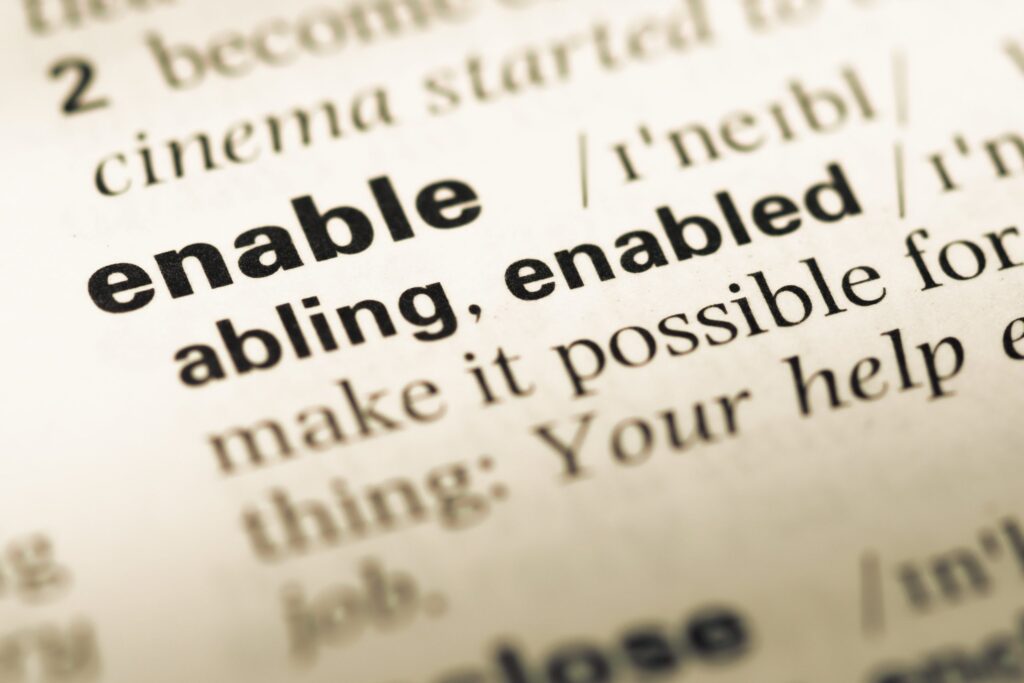[vc_row][vc_column][vc_custom_heading text=”The Family Disease” use_theme_fonts=”yes”][vc_column_text]Addiction is often referred to as a “family disease.” People struggling with addiction don’t only cause emotional, mental, physical and financial harm to themselves, they carry these burdens to their families and friends. Despite the hurtful behavior and the pain that it causes, we don’t stop loving someone just because they are struggling with addiction. But the line between loving and supporting an individual with addiction and enabling their behavior and be difficult to discern. Avoid the following five enabling behaviors.[/vc_column_text][/vc_column][/vc_row][vc_row][vc_column][vc_single_image image=”29684″ img_size=”full” alignment=”center”][/vc_column][/vc_row][vc_row][vc_column][vc_column_text]
- Overlooking a person’s drinking or drug use or denying that it is a problem
If a loved one’s substance abuse has caused negative consequences such as arrests, the inability to maintain a job, or lying to family and friends, it is important not to excuse these actions as circumstantial or write them off as something that everyone goes through. Denying that the consequences are a direct result of substance abuse is not helpful for the person suffering.[/vc_column_text][vc_separator][/vc_column][/vc_row][vc_row][vc_column][vc_column_text]
- Blaming others, including the person’s boss, significant other, or children, for their addiction
Harboring resentments towards others is one of the main causes of drug and alcohol use and subsequent abuse. A person struggling with use might say that people they interact with regularly are causing them to drink. Even if these relationships are causing great stress to the struggling person’s life, do not discount that they are not the ones making them drink. Validating that narrative can exacerbate drinking or drugging.[/vc_column_text][vc_separator][/vc_column][/vc_row][vc_row][vc_column][vc_column_text]
- Lying to others to keep the person’s drinking or drugging a secret
There is no doubt that addiction and alcoholism carry a great stigma in our culture. Those who use, and their families alike feel shame and embarrassment, and therefore keep discussions about a loved one’s substance abuse held to a very tight circle of people, usually behind closed doors. While respecting one’s privacy is one thing, keeping it a secret can lead to avoiding the issue, and giving the struggling person more opportunities to cause harm.[/vc_column_text][vc_separator][/vc_column][/vc_row][vc_row][vc_column][vc_column_text]
- Avoiding confrontations with the struggling person to keep peace in the relationship
If you live with a using or drinking person there will likely be many occasions when they come home under the influence, even if they do not use or drink in the home. If you suspect the person is high or drunk, but don’t address the issue for fear of getting into an argument, you are inadvertently giving that person permission to stay in the household while intoxicated.[/vc_column_text][vc_separator][/vc_column][/vc_row][vc_row][vc_column][vc_column_text]
- Asserting there will be consequences for continued use, but do not follow through on them
A using person’s behavior might get so bad that you need to set boundaries, possibly even forcing them to leave your home. It is important not to assert things like this, or cutting them off financially, only to continue doing them. This will only validate for the struggling person that these are “empty threats,” giving them confidence to continue using without consequences.[/vc_column_text][vc_separator][/vc_column][/vc_row][vc_row][vc_column][vc_custom_heading text=”There is Help” use_theme_fonts=”yes”][vc_column_text]If a struggling person does not wish to seek treatment on their own, it is worth considering whether staging an intervention is necessary or would be beneficial. If an intervention seems premature, beginning to set financial and supportive boundaries with the individual is a good first step to avoid further enabling their use. Most people who struggle with addiction do not receive the treatment they need, but help is available. Learn more about our Levels of Care and unique treatment options for early sobriety and sustained recovery. To reach our national call center, dial 833-216-3079.[/vc_column_text][/vc_column][/vc_row]








